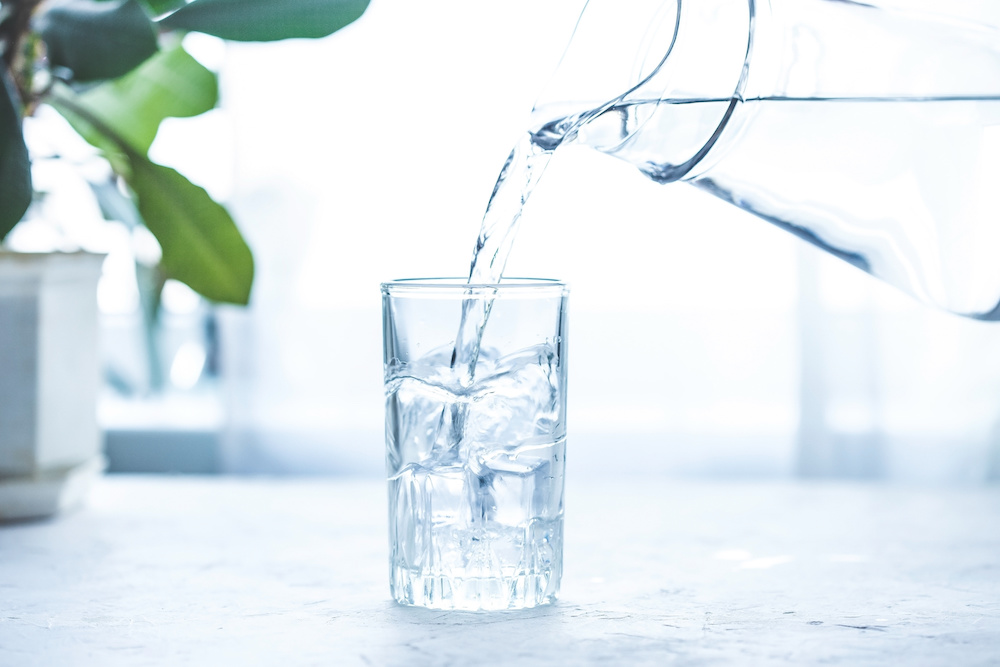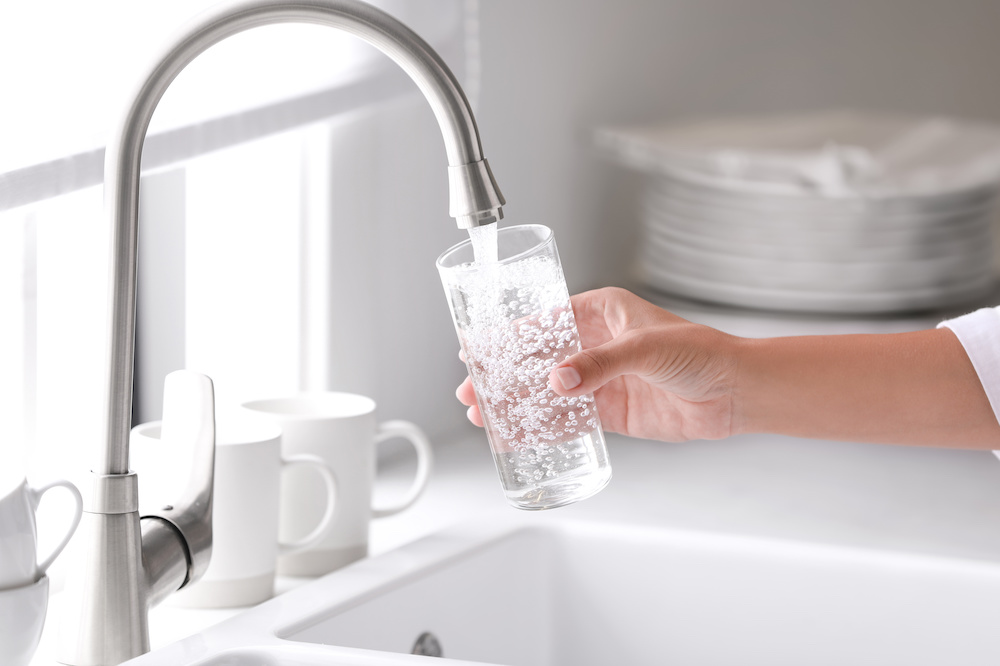According to an article published by the United States Geological Survey, the human body comprises 55 to 60% water.
It means that the quantity and quality of water we drink can impact our health.
Today, you can find different types of drinking water, and among the most popular are alkaline water and purified water.
But how different is alkaline water vs purified water? Do they have similarities? And, more importantly, which is the better choice for daily hydration?
What Is Alkaline Water?
Alkaline water is simply a type of filtered water with a higher pH level than tap water or normal drinking water, which has a neutral pH.
To be precise, alkaline water will have a pH scale reading higher than 7.
Is Alkaline Water Safe?
According to the United States Environmental Protection Agency, the pH level standard for safe drinking water ranges from 6.5 to 8.5.
So, yes, typical alkaline water is safe to drink; in fact, it can offer some health benefits.
For instance, one study found that drinking high-pH water can impact blood viscosity, ensure efficient blood flow, and boost physical recovery after an intense workout session.
Some people also believe that it can reduce acidity in the bloodstream. That said, we want to emphasize that more research is still needed to verify these health claims.
In terms of important minerals, alkaline water has the “alkalizing” types, such as calcium and potassium.
What Is Purified Water?
As the name suggests, purified water is water free of contaminants, such as parasites, bacteria, metals, and chemical pollutants.
There are different methods used to obtain purified water. Reverse osmosis is one of the most common and regarded as the safest, without the potential concerns that come from over purification.
Is Purified Water Safe?
Since purified water doesn’t contain any contaminants, it is typically regarded as a safer drinking water option than other types of water.
After all, many water impurities can really threaten our health. Having heavy metals in your drinking water is a good example.
According to a paper published by the Journal of Cellular Biochemistry, consuming drinking water contaminated by heavy metals such as arsenic, mercury, and nickel can lead to heart disease, nerve damage, increased risk of cancer, and a whole gamut of other health problems.
Alkaline Water vs Purified Water
Now that we have a better understanding of the two types of water, let’s compare and contrast them.
The Similarities
The following are the main similarities of alkaline and purified water:
They’re both healthy and safe for drinking.
As we have mentioned, both alkaline and purified water are safe for consumption. Just make sure to get your alkaline water from a reliable source.
They’re both potentially accessible at home.
It is possible to create your own purified and alkaline water at home; in fact, there are steps to adjust the alkalinity of your purified water.
This is possible by using a water purification system, and there are different options out there.
Of course, they vary in benefits and costs, so be sure to research beforehand to determine the best choice for you and your family.
Once you have purified water, you can increase its alkalinity with the help of a water ionizer. Again, different types of water ionizers are available, much like water purification systems.
There’s even a more portable option: an ionizing water pitcher, allowing you to increase the alkalinity of your water even while you’re traveling.
Here’s a quick side note: Many references suggest adding a little baking soda to your water to increase its pH levels.
While effective, we don’t highly recommend it because baking soda is high in sodium. Hence, it’s not an ideal option for everyone.
They’re both delicious.
For us, alkaline water has a taste closely similar to spring water. It’s sweeter than regular water. Hence, we consider it an ideal choice for people who find it challenging to hydrate enough.
The deliciousness of alkaline water can definitely be encouraging.
On the other hand, water purification systems efficiently clear water of weird scents and tastes.
That’s why purified water is great for cooking and can interact well with any food.

Their Differences
In terms of the key differences between alkaline water vs purified water, here they are:
They have different levels of pH.
The most obvious difference is that they have different levels of pH. Alkaline has a higher pH, meaning it is basic.
While purified water should have a neutral pH, it tends to begin shifting pH levels when exposed to air.
Hence, purified water can turn into acidic water when exposed to carbon dioxide.
Taking a quick trip back to science class, pure water (or H2O) turns into carbonic acid (or H2CO3) when they come together. This process is called acidification.
Alkaline water has more potential health benefits.
One of the biggest disadvantages of purified water is that it has fewer minerals. That’s because the purification process to remove contaminants also strips it of essential minerals.
Fortunately, you can turn it into healthier water by remineralizing it with the necessary minerals for your specific condition.
That said, aside from the benefits of alkaline water that we have already mentioned above, here are the other potential advantages of drinking alkaline water:
It can potentially support cancer treatment.
According to an article published by the Proceedings of the National Academy of Sciences of the United States of America, cancer thrives in an acidic environment.
Tumors are even said to create an acidic environment to make it easier for them to invade healthy tissues.
Hence, there’s no wonder why many believe that alkaline water can help in cancer treatment.
It can help us detox better.
One of the reasons medical professionals encourage us to drink eight glasses of water to help flush out toxins.
It assists the kidneys to excrete blood urea nitrogen more efficiently via urination and helps improve bowel movement.
That said, it’s said that water with higher pH has better detoxification capabilities, which is possible because of alkaline water’s negative oxidation-reduction potential or ORP.
According to the International Hydrogen Standards Association, water produced by ionizers, such as alkaline water typically has a negative ORP.
In a nutshell, ORP indicates the presence of potential oxidizing and reducing agents. In alkaline water’s case, its negative ORP signals the presence of reducing agents.
Also, alkaline water may benefit our immune system thanks to its detoxification factor.
It can help deal with acid reflux.
Finally, alkaline water can help deal with acid reflux because it can deactivate pepsin, the main enzyme responsible for reflux.
In fact, according to a study published by the Annals of Otology, Rhinology, and Laryngology, it is a better hydration option for reflux patients, especially when compared to regular tap water.
It also helps neutralize the stomach’s acidity since it increases its pH value.
On the other hand, since purified water is stripped of all the other components that you’ll typically find in regular water, its main health benefit is solving the major drinking water challenges worldwide, according to the World Health Organization.
That is preventing the spread of water-borne diseases and harmful contaminants.
Alkaline water is more expensive.
Two major factors can explain why alkaline water is more costly, especially when compared to tap water.
First, it undergoes more processing compared to other types of water. Second, you should also consider the current hype surrounding this product.
As mentioned, creating your own alkaline water at home is one option. However, water ionizers can also be an investment.
Which Should You Drink?
Here now lies the important question: which type of water is better?
It’s clear by now that there is no universal answer or perfect solution when it comes to your individual preferences and needs. After all, we are all different.
How one can achieve a healthy lifestyle might not work for the other, which also applies when choosing the type of water you need to drink to improve your wellbeing and achieve the best effects.
Thus, whether alkaline or purified drinking water works best for you would depend on your priorities.
If you are most concerned about contamination due to your location (for instance, if you live near an industrial complex or have an unconventional water source), then the wise option would be to drink purified water.
On the other hand, alkaline water would probably serve you better if you have medical concerns concerning mineral content and acidity.
Can I Drink Alkaline Water Everyday?
Many experts recommend alkaline water for daily hydration due to its potential benefits, stating that its only disadvantage is its cost.
That said, we highly suggest you consult your doctor before making drastic changes in your diet.
Some references discourage drinking alkaline water daily since it might cause gastrointestinal distress due to its impact on natural stomach acidity.
They also claim that it can cause kidney problems due to its high mineral content.
That said, these claims have not been scientifically proven yet. More research is necessary.
Where Can You Get Alkaline Water?
If you have decided on alkaline water for your daily hydration, you will be pleased to learn that it is widely commercially available.
After all, it’s one of the most popular water products today. Preparing your own alkaline water at home is also an option.
Make a Choice Now!
In the end, determining the best hydration option would be up to you. The best part is that both alkaline and purified water have benefits.
They both have encouraging tastes. You can prepare your own alkaline and purified water at home. Most importantly, they are both safe and healthy to drink.
Yet, they also have differences. For instance, alkaline water is more costly. However, you have to consider if the alkalinity and presence of natural minerals are worth the extra price.
We simply hope that this quick comparison has helped you in making the crucial decision of which water to drink.
Stay hydrated!

